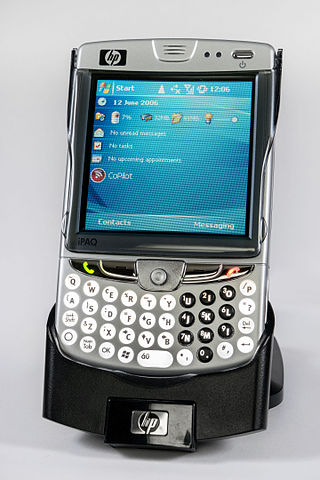A computing platform, digital platform, or software platform is the infrastructure on which software is executed. While the individual components of a computing platform may be obfuscated under layers of abstraction, the summation of the required components comprise the computing platform.

The iPAQ is a discontinued line of Pocket PC devices produced from 2000 until 2010. It was first unveiled by Compaq in April 2000. iPAQ included PDA-devices, smartphones and GPS-navigators. A substantial number of devices were outsourced from Taiwanese HTC corporation.

An Embedded Operating System (EOS) is an operating system designed specifically for embedded computer systems. These systems aim to enhance functionality and reliability to perform dedicated tasks. When the multitasking method employed allows for timely task execution, such an OS may qualify as a real-time operating system (RTOS).

GPE is a graphical user interface environment for handheld computers, such as palmtops and personal digital assistants (PDAs), running some Linux kernel-based operating system. GPE is a complete environment of software components and applications which makes it possible to use a Linux handheld for tasks such as personal information management (PIM), audio playback, email, and web browsing.

Unix System V is one of the first commercial versions of the Unix operating system. It was originally developed by AT&T and first released in 1983. Four major versions of System V were released, numbered 1, 2, 3, and 4. System V Release 4 (SVR4) was commercially the most successful version, being the result of an effort, marketed as Unix System Unification, which solicited the collaboration of the major Unix vendors. It was the source of several common commercial Unix features. System V is sometimes abbreviated to SysV.
Wind River Systems, Inc., also known as Wind River, is an Alameda, California–based company, subsidiary of Aptiv PLC. The company develops embedded system and cloud software consisting of real-time operating systems software, industry-specific software, simulation technology, development tools and middleware.
Computer operating systems based on the Linux kernel are used in embedded systems such as consumer electronics, in-vehicle infotainment (IVI), networking equipment, machine control, industrial automation, navigation equipment, spacecraft flight software, and medical instruments in general.
A hypervisor, also known as a virtual machine monitor (VMM) or virtualizer, is a type of computer software, firmware or hardware that creates and runs virtual machines. A computer on which a hypervisor runs one or more virtual machines is called a host machine, and each virtual machine is called a guest machine. The hypervisor presents the guest operating systems with a virtual operating platform and manages the execution of the guest operating systems. Unlike an emulator, the guest executes most instructions on the native hardware. Multiple instances of a variety of operating systems may share the virtualized hardware resources: for example, Linux, Windows, and macOS instances can all run on a single physical x86 machine. This contrasts with operating-system–level virtualization, where all instances must share a single kernel, though the guest operating systems can differ in user space, such as different Linux distributions with the same kernel.
Lineo was a thin client and embedded systems company spun out of Caldera Thin Clients by 20 July 1999.

OpenEmbedded (OE) is a build automation framework and cross-compile environment used to create Linux distributions for embedded devices. The framework is developed by the OpenEmbedded community, which was formally established in 2003. OpenEmbedded is the recommended build system of the Yocto Project, which is a Linux Foundation workgroup that assists commercial companies in the development of Linux-based systems for embedded products.
Rocky Mountain BASIC is a dialect of the BASIC programming language created by Hewlett-Packard. It was especially popular for control of automatic test equipment using GPIB. It has several features which are or were unusual in BASIC dialects, such as event-driven operation, extensive external I/O support, complex number support, and matrix manipulation functions. Today, RMB is mainly used in environments where an investment in RMB software, hardware, or expertise already exists.

The Jornada was a line of personal digital assistants or PDAs manufactured by Hewlett-Packard. The Jornada was a broad product line that included Palm-Size PCs, Handheld PCs, and Pocket PCs. The first model was the 820, released in 1998, and the last was the 928 model in 2002 when Compaq and HP merged. The Jornada line was then succeeded by the more popular iPAQ model PDAs. All Jornada models ran Microsoft Operating Systems that were based on Windows CE.

The Yocto Project is a Linux Foundation collaborative open source project whose goal is to produce tools and processes that enable the creation of Linux distributions for embedded and IoT software that are independent of the underlying architecture of the embedded hardware. The project was announced by the Linux Foundation in 2010 and launched in March, 2011, in collaboration with 22 organizations, including OpenEmbedded.

LibreCMC is a GNU/Linux-libre distribution for computers with minimal resources, such as the Ben NanoNote, ath9k-based Wi-Fi routers, and other hardware with emphasis on free software. Based on OpenWrt, the project's goal is to aim for compliance with the GNU Free System Distribution Guidelines and ensure that the project continues to meet these requirements set forth by the Free Software Foundation (FSF). LibreCMC does not support ac or ax due to a lack of free chipsets.
wolfSSH is a small, portable, embedded SSH library targeted for use by embedded systems developers. It is an open-source implementation of SSH written in the C language. It includes SSH client libraries and an SSH server implementation. It allows for password and public key authentication.









